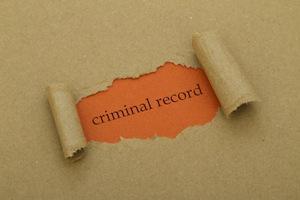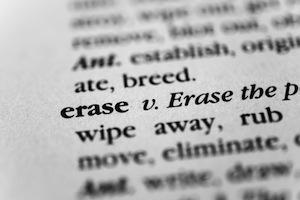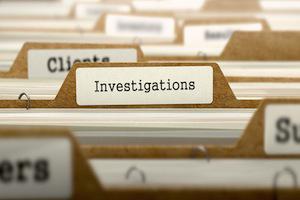
 If you have a criminal record, you may have discovered first hand how it can affect daily activities. A criminal record may prohibit you from securing gainful employment, it may affect your dating life, and it may even impact your ability to enjoy activities with your children. There are a wide variety of reasons why you may be interested in clearing your record. However, the question remains how one goes about removing those pesky details. The answer lies within expungement and sealing.
If you have a criminal record, you may have discovered first hand how it can affect daily activities. A criminal record may prohibit you from securing gainful employment, it may affect your dating life, and it may even impact your ability to enjoy activities with your children. There are a wide variety of reasons why you may be interested in clearing your record. However, the question remains how one goes about removing those pesky details. The answer lies within expungement and sealing.
Expungement vs. Sealing
Expungement is a the legal process of requesting that a criminal record be wiped entirely clean. If a judge approves your expungement request, and the Illinois State Police are ordered to “expunge” your record, then the Illinois State Police and the arresting agency will either return the records to you or destroy the records entirely.
 Mistakes occur regularly. Sometimes we forget to do something extremely important, like renewing our car registration on time or paying a ticket. Occasionally, we can become lost in thought and miss a speed traffic sign. However, if these things are overlooked time and again, the suspension of your driver's license or even the revocation of your driving privileges may result. Therefore, it is important to understand the various circumstances that, if handled incorrectly, could result in the loss of all driving privileges, either for a short time or indefinitely.
Mistakes occur regularly. Sometimes we forget to do something extremely important, like renewing our car registration on time or paying a ticket. Occasionally, we can become lost in thought and miss a speed traffic sign. However, if these things are overlooked time and again, the suspension of your driver's license or even the revocation of your driving privileges may result. Therefore, it is important to understand the various circumstances that, if handled incorrectly, could result in the loss of all driving privileges, either for a short time or indefinitely.
How Suspension Occurs
In Illinois, there are a variety of reasons that may result in the suspension of your driving privileges. Moreover, it may be surprising to discover that violations do not necessarily need to occur while you are driving, nor do they have to be vehicle related at all. A driver’s license may be taken away for the following reasons:
 Violence seems to occur everywhere today—in the mainstream media, in workplaces, and in your own home. Many people blame various sources: added stress, alcohol or drug use, or even because an individual simply snapped. The reasoning is limitless and the factors that trigger anger are different for everyone.
Violence seems to occur everywhere today—in the mainstream media, in workplaces, and in your own home. Many people blame various sources: added stress, alcohol or drug use, or even because an individual simply snapped. The reasoning is limitless and the factors that trigger anger are different for everyone.
Laws do not handle violence cases lightly in the state of Illinois. In fact, they can be dealt with in a very harsh manner. Furthermore, domestic violence and assault charges are very different and are also susceptible to different penalties.
What is Assault and Aggravated Assault?
As with the vast majority of criminal charges, there are varying degrees of severity. The same holds true with assault and aggravated assault, which are both different from domestic violence.

If you are charged with a first-time DUI offense, you may be unsure as to how you should respond when speaking with an officer. For example, should you be cooperative and do everything an officer asks? Or, should you refuse to do anything? The answer lies somewhere in between the two.
First and foremost, an officer's job is to keep citizens safe. Yet, just like every human being, an officer may be experiencing a bad day, therefore resulting in a short temper and little patience. When responding to an officer's questions, do not become antagonistic in your responses; however, do not admit guilt. Admission adds evidence against you and is hard to come back from defensively. An officer cannot make an arrest without just cause.
Also, keep in mind that police are not required to tell the truth. Officers are legally allowed to lie to convince you to cooperate. Still, answer an officer's questions politely but do not offer any other information such as how many beverages you consumed. Moreover, do not discuss your driving that night. In sum, it is best to keep your mouth shut as much as possible. Anything that is communicated during that time is allowable in a court of law.
 The worst case scenario is happening to you right this moment and you have a weapon to defend yourself, yet you have not taken the proper avenues to make your weapon purchase legal. What do you do?
The worst case scenario is happening to you right this moment and you have a weapon to defend yourself, yet you have not taken the proper avenues to make your weapon purchase legal. What do you do?
Do you pretend you do not have the weapon in order to avoid legal trouble, or do you use it to defend yourself, regardless of the legal ramifications? If you choose to defend yourself, will you face weapons charges?
These are not the best questions to ask yourself in ‘the heat of the moment,’ yet they are certainly questions to consider before you even decide to carry.
The Law
Illinois became the last state in the United States to formally issue a concealed carry program on July 9, 2013. Comparisons between Illinois and other state regulations include:
 There are several different charges related to juvenile theft. Often glamorized by the music industry and mainstream media, many impressionable young adults are led to believe that it is nearly a rite of passage to steal and get away with it. Some consider stealing as a rush; others do it because “everyone else is doing it." Additionally, there may be cases in which a juvenile steals food because he or she could not afford to eat. However, the most common forms of juvenile theft, all prosecutable by law, include the following:
There are several different charges related to juvenile theft. Often glamorized by the music industry and mainstream media, many impressionable young adults are led to believe that it is nearly a rite of passage to steal and get away with it. Some consider stealing as a rush; others do it because “everyone else is doing it." Additionally, there may be cases in which a juvenile steals food because he or she could not afford to eat. However, the most common forms of juvenile theft, all prosecutable by law, include the following:
Shoplifting: Removing the merchandise from a display or shelf and then exiting the premises with the item without any intention of paying. Merchandise is product that an establishment would sell to the public.
 Everyone makes mistakes. Some mistakes can change the direction of our future and potentially haunt us for the rest of our lives. We may even look back after an incident has occurred and wish that we could erase it. Thankfully, the court system has the option to seal or even expunge records. Although these options may not be available in all circumstances, expungement and sealing records have given people a second chance at a better future.
Everyone makes mistakes. Some mistakes can change the direction of our future and potentially haunt us for the rest of our lives. We may even look back after an incident has occurred and wish that we could erase it. Thankfully, the court system has the option to seal or even expunge records. Although these options may not be available in all circumstances, expungement and sealing records have given people a second chance at a better future.
What Can a Criminal Record Affect?
Aside from shaking your self confidence a bit, a criminal record can affect several aspects of your life. Even if you are not convicted of a crime, an arrest and investigation is still a matter of public record and can show up in any background check.
 Tax season is upon us and citizens are receiving refund checks for taxes paid. However, in Chicago, residents may also be receiving a second refund.
Tax season is upon us and citizens are receiving refund checks for taxes paid. However, in Chicago, residents may also be receiving a second refund.
If you were issued a red-light traffic ticket since 2003, you may receive all or some of that money back. A Circuit Court Judge recently ruled in favor of several cases in which individuals were suing the city for not sending a second notice for traffic violation citations.
Red Light Camera Enforcement
In the city of Chicago, a Red Light Camera Enforcement system is utilized. This began in 2003 with simply two intersections and has grown to over 300 cameras based on traffic severity in the area. Digital cameras are placed at these intersections that use radar to detect when someone is approaching and passing through an intersection. If the radar detects a vehicle entering the intersection after the light has turned red, a still photograph of the rear of the vehicle is captured. The vehicle's license plate number is captured as well. The City Department of Revenue reviews and issues citations to the registered owner and operator of the vehicle in the photograph. According to city officials, this has significantly reduced the occurrence of severe and fatal accidents because it makes potential red light runners think twice before running the traffic signal.
 Traffic tickets are often viewed as a minor annoyance. A fine is paid and the driver moves on. Still, there are times when a traffic ticket can have several long-lasting consequences.
Traffic tickets are often viewed as a minor annoyance. A fine is paid and the driver moves on. Still, there are times when a traffic ticket can have several long-lasting consequences.
Financial Consequences
You may be required to pay more money than what a fine requires when you are issued a ticket. Depending on your record, your insurance rates may also increase. Some unfortunate drivers have found that their insurance rates become so high that they are no longer able to afford to drive.
If you are issued too many tickets in a certain period of time, usually one to two years depending on your age, your driver's license may be suspended. In addition, you will have to pay fees to have your license reinstated. If you have to drive for work, then you could face losing your job as well.
 The state legislature has passed several laws that set the time period when someone can be charged with a crime. This time period is called the statute of limitations. However, sometimes a crime is too old for you to be prosecuted and understanding if the statute of limitations has expired can be complicated.
The state legislature has passed several laws that set the time period when someone can be charged with a crime. This time period is called the statute of limitations. However, sometimes a crime is too old for you to be prosecuted and understanding if the statute of limitations has expired can be complicated.
Basic Statutes of Limitations
Illinois law provides that most misdemeanors have a statute of limitations of 18 months. Most felonies have a statute of limitations of three years. Additionally, many specific crimes also have their own specific statute of limitations. Examples of specific statutes of limitations include:
 A lawyer’s time and advice are his stock and trade.
A lawyer’s time and advice are his stock and trade.